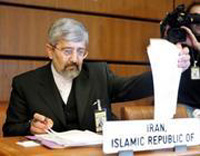West poisoning atmosphere of IAEA meeting

Western nations are "poisoning the environment" at a key meeting of the International Atomic Energy Agency by underestimating initial successes of an agency probe into his nation's nuclear past, a senior Iranian envoy said Wednesday.
Ali Ashgar Soltanieh, Iran's chief delegate to the agency, spoke outside a 35-nation IAEA board meeting as it prepared to end its review of an agency report describing Iran's cooperation with the probe as "a significant step forward."
But the U.S. and its western allies continue to suspect that Iran is exploiting a plan outlining what questions Iran will answer and when as a smoke screen to deflect attention from its continued defiance of a Security Council ban on enrichment, a potential pathway to nuclear arms.
A statement by the European Union on Tuesday appeared to reflect that concern; it focused mostly on Iran's defiance of a U.N. Security Council ban and gave relatively short shrift to IAEA chief Mohamed ElBaradei's reported successes in prying answers from Iran.
The statement said the EU has "taken note" of those efforts - the most noncommittal of diplomatic terms that falls substantially short of approval.
A diplomat who spoke to the AP on condition anonymity, because of a bar on divulging proceedings at the closed meeting, said ElBaradei subsequently left the conference to show his disapproval of the EU's lukewarm approach.
"He was disappointed," said the diplomat.
Soltanieh, in comments to The Associated Press, called the West's approach "regrettable," saying: "It has poisoned the environment."
"If they underestimate and question this pact, they are weakening the IAEA," he said.
Backing Iran, nonaligned nations on Tuesday rejected "interference" - an allusion to U.S. concerns about the International Atomic Energy Agency's newest Tehran probe.
Norma Miguelina Goicochea Estenoz of Cuba also expressed support for the work of the agency and Mohamed ElBaradei in her capacity as head of the agency's nonaligned board members.
A nonaligned statement delivered by the Cuban ambassador cited the pact, under which Iran is cooperating with the IAEA, as saying Iran will be treated "in a routine manner" if it holds to the agreement and fully answers all questions posed by the agency.
That would mean an end both to U.N. sanctions and the threat of new ones for Iran's refusal to end uranium enrichment - a position strongly opposed by the United States and most other Western countries.
The U.S. was scheduled to speak on Wednesday.
Before the start of the board meeting Monday, diplomats told the AP that ElBaradei's decision to agree on an action plan setting mileposts for what Iran has to answer and when without consulting the board had led to Western concerns that he has overstepped his authority. They demanded anonymity in exchange for discussing confidential information.
In comments to reporters directed at the West, Goicochea Estenoz called for "noninterference in the work of the agency," adding that nonaligned countries offered "full support for the professionalism" of ElBaradei.
Separately in her statement to delegates, she said the nonalignment movement "strongly rejects any undue pressure or interference" put upon the agency.
Despite their reservations about the plan, Washington and other nations backing new U.N. sanctions against Tehran have toned down initial criticism because they have realized that opposition could backfire.
Too much criticism could leave the impression that the U.S., France and Britain, the most vocal backers of new U.N. sanctions, did not care about resolving the issue that had sent Iran's nuclear file to the Security Council in the first place - its refusal to cooperate in dispelling suspicions about past nuclear activities.
Subscribe to Pravda.Ru Telegram channel, Facebook, RSS!




